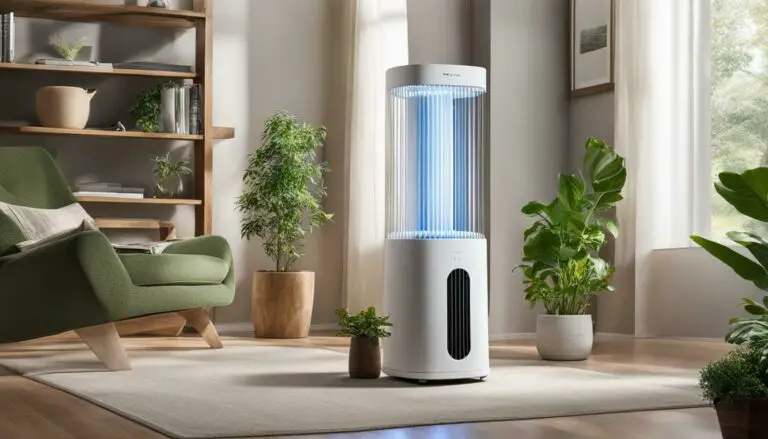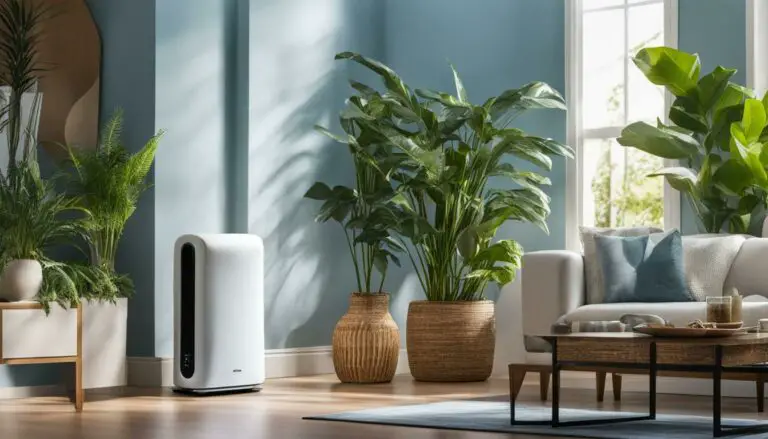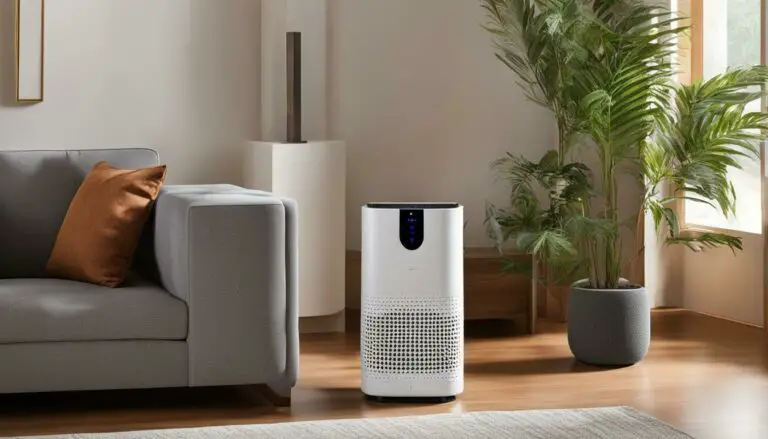Debunking the Safety Concerns of Ionic Air Purifiers: The Truth
Ionic air purifiers have been the subject of safety concerns, but it is essential to separate fact from fiction. These devices have been marketed as effective in killing bacteria, fungi, and viruses, especially during the COVID-19 pandemic. However, a recent study conducted by researchers at Illinois Tech, Portland State University, and Colorado State University has shed light on some concerning findings. It is crucial to understand the potential risks and limitations associated with the use of ionic air purifiers.
Key Takeaways:
- While some volatile organic compounds (VOCs) may be decreased, the study found that others, such as oxygenated VOCs and toluene, were actually increased by ionizing devices.
- VOC exposure has been linked to various health effects, highlighting the unintended health consequences of using these purifiers.
- There are inadequate test standards and a lack of peer-reviewed studies assessing the effectiveness and safety of ionic air purifiers.
- Using ionizing devices can potentially lead to the formation of harmful byproducts and the rapid generation of new air pollutants.
- Negative ions generated by ionizers have been found to increase oxidative stress levels and have adverse effects on cardiovascular health.
- It is recommended to follow evidence-based measures suggested by organizations like the EPA and ASHRAE to reduce the airborne transmission of COVID-19, including air filtration, enhanced ventilation, face coverings, and physical distancing.
- Not all air purifiers are created equal, and it is crucial to consider the specific mechanisms and filtration capabilities of each purifier.
Understanding Ionic Air Purifiers: How They Work and Their Benefits
Before addressing the safety concerns, it is crucial to understand the basic functioning and advantages of ionic air purifiers. Ionic air purifiers, also known as ionizers, work by emitting negatively charged ions into the air. These ions attach themselves to airborne particles, such as dust, allergens, and pollutants, causing them to become charged. The charged particles then attract to positively charged surfaces, such as walls or furniture, effectively removing them from the air.
One of the key benefits of ionic air purifiers is their ability to remove ultrafine particles that may not be captured by traditional filters. These ultrafine particles, often less than 0.1 micrometers in size, can include pollutants like smoke, pet dander, and even viruses. By charging these particles, ionic air purifiers can effectively remove them from the air you breathe, improving overall air quality.
Another advantage of ionic air purifiers is their low maintenance. Unlike traditional filters that need regular replacement, ionizers do not require filter changes. This can result in cost savings over time.
How do ionic air purifiers compare to other types?
While ionic air purifiers offer unique benefits, it is important to note that they are not the only option available. Other types of air purifiers, such as HEPA filters and activated carbon filters, use different mechanisms to trap and remove airborne particles. HEPA filters, for example, can effectively capture particles as small as 0.3 micrometers, including allergens and some viruses.
When considering an air purifier, it’s essential to evaluate your specific needs and compare the different technologies. Some individuals may find that a combination of filtration methods, such as combining an ionizer with a HEPA filter, offers the best solution for their indoor air quality.
| Pros | Cons |
|---|---|
| Effective at removing ultrafine particles | Potential production of harmful byproducts |
| Low maintenance, no filter replacement | Inadequate test standards and lack of peer-reviewed studies |
| Cost savings over time | Potential adverse effects on cardiovascular health |
Overall, it’s important to weigh the benefits and potential drawbacks of ionic air purifiers before making a decision. While they may offer unique advantages, ensuring the safety and effectiveness of these devices requires further research and understanding. It is recommended to follow the guidance of reputable organizations, such as the EPA and ASHRAE, who suggest evidence-based measures like air filtration, enhanced ventilation, face coverings, and physical distancing to reduce the airborne transmission of diseases like COVID-19.
Research Findings on Ionic Air Purifiers: Unintended Health Consequences
Scientific studies have discovered unintended health consequences related to the use of ionic air purifiers, shedding light on potential risks. A study conducted by researchers at Illinois Tech, Portland State University, and Colorado State University revealed that these ionizing devices may not be as effective as previously claimed and can have unintended negative effects on indoor air quality.
The study found that while some volatile organic compounds (VOCs) were reduced by the ionization process, others, such as oxygenated VOCs and toluene, were actually increased. VOCs are known to be harmful and have been associated with various health effects, including respiratory issues and allergic reactions. Moreover, the research highlighted the inadequate test standards and lack of peer-reviewed studies on the effectiveness and safety of ionizing devices, which further raises concerns.
Another significant finding is the potential formation of harmful byproducts and the rapid generation of new air pollutants when using ionic air purifiers. Additional studies have shown that negative ions generated by these devices can increase oxidative stress levels in the body and have adverse effects on cardiovascular health. These findings underscore the need for more comprehensive research before embracing the widespread use of ionic air purifiers in our daily lives.
| Key Findings: | Implications: |
|---|---|
| Increased levels of harmful VOCs, including toluene. | Potential respiratory issues and allergic reactions. |
| Inadequate test standards and lack of peer-reviewed studies. | Uncertain effectiveness and safety of ionizing devices. |
| Rapid generation of new air pollutants. | Potential negative impact on indoor air quality. |
| Elevated oxidative stress levels from negative ion exposure. | Possible adverse effects on cardiovascular health. |
While the use of air purifiers can be beneficial, it is important to note that not all air purifiers are created equal. It is crucial to consider the specific mechanisms and filtration capabilities of each purifier before making a decision. Following guidance from reputable organizations such as the Environmental Protection Agency (EPA) and the American Society of Heating, Refrigerating and Air-Conditioning Engineers (ASHRAE) is recommended. These organizations emphasize evidence-based measures like air filtration, enhanced ventilation, face coverings, and physical distancing to reduce the airborne transmission of diseases like COVID-19.
Inadequate Test Standards and Lack of Peer-Reviewed Studies: Addressing Research Limitations
The current test standards and scarcity of peer-reviewed studies pose limitations in assessing the true effectiveness and safety of ionic air purifiers. While these devices have gained popularity for their supposed ability to kill bacteria, fungi, and viruses, it is vital to critically evaluate the available research.
A study conducted by researchers at Illinois Tech, Portland State University, and Colorado State University shed light on the potential shortcomings of ionic air purifiers. The findings revealed that while some volatile organic compounds (VOCs) were reduced, others such as oxygenated VOCs and toluene actually increased when using these devices. Exposure to VOCs has been associated with various health effects, raising concerns about the unintended consequences of utilizing ionic air purifiers.
The study also emphasized the lack of comprehensive test standards and peer-reviewed studies in assessing the safety and effectiveness of ionizing devices. This knowledge gap significantly hinders our understanding of the potential risks and benefits of these purifiers. Furthermore, the use of such devices can lead to the formation of harmful byproducts and the rapid generation of new air pollutants, further exacerbating the need for more rigorous research.
Other studies have raised additional concerns regarding the negative ions generated by these ionizers. These negative ions have been found to increase oxidative stress levels and have adverse effects on cardiovascular health. The cumulative evidence, or the lack thereof, underscores the need for caution and further investigation before considering widespread use of these devices.
| Key Points: |
|---|
| The current test standards and scarcity of peer-reviewed studies limit the assessment of ionic air purifier effectiveness and safety. |
| A study found that while some VOCs were reduced, others increased when using ionic air purifiers, raising concerns about unintended health consequences. |
| Inadequate test standards and lack of research lead to uncertainty regarding potential harmful byproducts and the rapid generation of new air pollutants. |
| Negative ions generated by ionizers have been linked to increased oxidative stress levels and adverse cardiovascular effects. |
Harmful Byproducts and Potential Air Pollutants: Uncovering the Risks
The use of ionic air purifiers has the potential to produce harmful byproducts and introduce new air pollutants, raising concerns about their overall safety. A recent study conducted by researchers at Illinois Tech, Portland State University, and Colorado State University shed light on these risks. The study found that while some volatile organic compounds (VOCs) were decreased, others, such as oxygenated VOCs and toluene, were actually increased in the air. Exposure to VOCs has been linked to various health effects, including respiratory irritation and the potential for long-term health issues.
Furthermore, the study highlighted the inadequate test standards and lack of peer-reviewed studies when it comes to evaluating the effectiveness and safety of ionizing devices. This lack of comprehensive research raises concerns about the potential formation of harmful byproducts and the rapid generation of new air pollutants associated with the use of ionic air purifiers.
Other studies have also found that negative ions generated by these purifiers can increase oxidative stress levels and have adverse effects on cardiovascular health. Such findings further add to the safety concerns surrounding these devices. Therefore, it is crucial to exercise caution and thoroughly evaluate the specific mechanisms and filtration capabilities of each air purifier before making a purchasing decision.
| Key Findings: | Implications: |
|---|---|
| Some VOCs decreased, while others increased | Exposure to increased VOCs can lead to respiratory irritation and potential long-term health issues |
| Inadequate test standards and lack of peer-reviewed studies | Raise concerns about the safety and effectiveness of ionic air purifiers |
| Negative ions can increase oxidative stress | Adverse effects on cardiovascular health |
It is important to note that not all air purifiers are created equal, and simply relying on ionic technology may not guarantee desired outcomes. To reduce the airborne transmission of diseases like COVID-19, reputable organizations like the Environmental Protection Agency (EPA) and the American Society of Heating, Refrigerating and Air-Conditioning Engineers (ASHRAE) recommend evidence-based measures such as air filtration, enhanced ventilation, face coverings, and physical distancing. Therefore, before investing in an ionic air purifier, it is crucial to consider the available research and expert guidance to ensure the safety and effectiveness of the chosen device.
Guidance from Experts: Evidence-Based Measures for Airborne Transmission Safety
To ensure safety in airborne transmission scenarios, it is advisable to follow expert recommendations and evidence-based measures, guiding the use of ionic air purifiers and other preventive measures. In light of the safety concerns and lack of research surrounding ionic air purifiers, organizations like the Environmental Protection Agency (EPA) and the American Society of Heating, Refrigerating, and Air-Conditioning Engineers (ASHRAE) offer valuable guidance to minimize the risk of airborne transmission.
According to these expert recommendations, a comprehensive approach to reducing airborne transmission should include a combination of preventive measures such as air filtration, enhanced ventilation, face coverings, and physical distancing. These measures work synergistically to minimize the presence of respiratory droplets and fine aerosols in indoor environments, reducing the potential for infection.
Implementing high-efficiency air filtration systems that meet the standards recommended by the EPA and ASHRAE can effectively capture airborne particles, including potential pathogens. It is important to consider the specific mechanisms and filtration capabilities of each air purifier to ensure its effectiveness in removing contaminants from the air.
| Expert Recommendations | Benefits |
|---|---|
| Air filtration systems | Capturing airborne particles, including potential pathogens |
| Enhanced ventilation | Increasing the exchange of indoor and outdoor air, diluting contaminants |
| Face coverings | Reducing the release and inhalation of respiratory droplets |
| Physical distancing | Minimizing close contact and the potential for respiratory droplet transmission |
It is crucial to understand that these measures should be implemented collectively, emphasizing the importance of a multi-layered approach to airborne transmission safety. Relying solely on ionic air purifiers may not be sufficient to mitigate the risk effectively, warranting the consideration of other preventive measures for comprehensive protection in various settings.
Conclusion
While ionic air purifiers have their benefits, it is crucial to be aware of the existing safety concerns and the need for further research in this field.
Factual data indicates that these ionizing devices may not be as effective as claimed and can have unintended health consequences. A study conducted by researchers at Illinois Tech, Portland State University, and Colorado State University found that while some volatile organic compounds (VOCs) were decreased, others, including oxygenated VOCs and toluene, were increased. Exposure to VOCs has been linked to various health effects.
Furthermore, the study highlighted the inadequate test standards and lack of peer-reviewed studies on the effectiveness and safety of ionizing devices. The use of these devices can potentially lead to the formation of harmful byproducts and the rapid formation of new air pollutants. Other studies have also identified that negative ions generated by ionizers can increase oxidative stress levels and have adverse effects on cardiovascular health.
Given these safety concerns and the insufficient research in this area, it is important to exercise caution before widespread use of ionic air purifiers. It is recommended to follow the guidance provided by organizations like the EPA and ASHRAE, which advocate for evidence-based measures such as air filtration, enhanced ventilation, face coverings, and physical distancing to reduce the airborne transmission of COVID-19.
It’s worth noting that not all air purifiers are created equal, and it is crucial to consider the specific mechanisms and filtration capabilities of each purifier. In conclusion, while ionic air purifiers offer potential benefits, their safety concerns and the need for further research highlight the importance of making informed decisions when it comes to improving indoor air quality.
FAQ
Are ionic air purifiers safe to use?
The safety concerns surrounding ionic air purifiers have been raised due to their potential health risks and the formation of harmful byproducts. It is important to consider the specific mechanisms and filtration capabilities of each purifier before use.
What are the benefits of using ionic air purifiers?
Ionic air purifiers work by emitting ions that attach to airborne particles, causing them to become heavy and fall out of the air. This can help reduce certain volatile organic compounds (VOCs). However, it is essential to note that not all VOCs are effectively removed, and some harmful substances may be increased.
What did the research findings say about the health consequences of using ionic air purifiers?
Studies have shown that negative ions generated by ionizers can increase oxidative stress levels and have adverse effects on cardiovascular health. Additionally, exposure to certain volatile organic compounds (VOCs) associated with ionic air purifiers has been linked to various health effects.
Have there been enough peer-reviewed studies on the safety and effectiveness of ionic air purifiers?
The study highlighted the inadequate test standards and lack of peer-reviewed studies on the effectiveness and safety of ionizing devices. This indicates the need for more research and understanding before widespread use of these devices.
Can the use of ionic air purifiers result in the formation of harmful byproducts?
Yes, ionizing devices have the potential to create harmful byproducts and rapid formation of new air pollutants. Some volatile organic compounds (VOCs) may be decreased, but others, including oxygenated VOCs and toluene, may be increased.
What evidence-based measures are recommended for airborne transmission safety?
Guidance from organizations like the EPA and ASHRAE suggest evidence-based measures such as air filtration, enhanced ventilation, face coverings, and physical distancing to reduce the airborne transmission of diseases like COVID-19. These measures are supported by research and are considered effective in mitigating risks.






